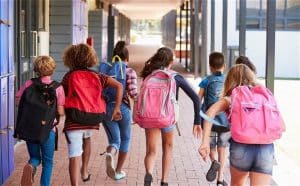How can psychologists help kids in aftermath of school shootings?

The recent episode of gun violence at The Covenant School in Nashville, TN, that ended the lives of three students and three teachers marked the 19th school shooting of 2023. As of mid-April, there have been more than 160 mass shootings in the United States in 2023, according to the Gun Violence Archive.
The upward trend of school shootings reached an all-time high in 2021 with 93 shootings resulting in injuries or deaths; almost nine times as many as a decade earlier.
The frequency of gun violence in schools today begs the question: what is it like to be a student in 2023?
More than 100,000 students attended a school in which a fatal shooting took place in 2018 and 2019 alone. Studies have consistently shown that students who survive school shootings suffer a myriad of mental health, educational, and economic consequences.
The rate of antidepressant prescriptions written for students under the age of 20 are more than 20 percent higher near schools that have experienced a fatal shooting, per a 2020 study. Studies have also found that school shootings lead to a drop in student enrollment, increased absenteeism, and a decline in average test scores.
But the consequences of these shootings are not limited to the students directly affected by them. Following the 2018 shooting at a high school in Parkland, FL, the Pew Research Center surveyed teens between 13 and 17 and found that the majority of them worried a school shooting could happen at their school.
“Schools used to be sanctuaries of safety (e.g., drug free zones, speed zones, etc). Now we have to worry about people coming in with assault rifles. It’s flipped our idea of how safe schools are on its head,” said Ryan Madigan, Psy.D, founder and director of the Boston Child Study Center.
Madigan believes that the way in which we help students cope with their anxiety about school shootings is of paramount importance. He describes three crucial topics to consider when addressing student anxiety about school shootings; validate their emotions, decrease uncertainty, and increase agency.
He pointed out that the anxiety students have is because of feelings of uncertainty. So it’s important to be curious and try to understand exactly what accounts for their fears.
“It gives you an opportunity to validate that they’re anxious for good reasons, so you’re reinforcing that they can trust their own thinking and their own feelings,” he said. “This also allows us to gather more information about their fears and help them begin to reduce uncertainty. The more uncertain we are about a stressful satiation, the more anxious we become. It’s our mind’s natural response to be as prepared as possible. Reducing some of the uncertainties will help make the anxiety more manageable.”
Helping students develop a sense of agency is also very important. Parents and clinicians often focus too much on reassuring a child that they are overestimating the likelihood of something like this happening. But the truth is school shootings occur regularly so this approach is likely to be invalidating. Instead, it would be more helpful to help increase a child’s sense of agency.
Asking important questions like, “If this were to happen in your school, what would you do? Where would you hide? How would you respond?” helps kids feel less helpless and therefore less afraid.
Madigan explained that validating anxiety, reducing uncertainty, and increasing agency can help prevent PTSD in the aftermath of a tragedy. The more psychologists, parents, and teachers can do to prevent feelings of helplessness and uncertainty, the less likely it will be that events will be encoded as trauma and develop into PTSD.
Denice Cronin, Psy.D, staff psychologist at McLean SouthEast Adolescent Acute Residential Treatment Program, believes psychologists, as well as social workers and other mental health professionals, should play an important role in the aftermath of a traumatic event at school.
She noted that trauma exposures impact every child and teenager differently. Oftentimes, kids will exhibit signs of trauma reactivity in the form of secondary emotions like fear, anger, or shame. In these instances, a caregiver or teacher may not understand those emotions as connected to trauma.
“It’s challenging to predict the impact of trauma at the time of an event,” said Cronin. “This makes it important to work with all children and adolescents in a trauma-informed manner and prioritize universal trauma-informed policies and practices in schools and other systems that work with families.”
